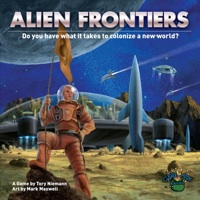
|
About OgreCave and its staff
|

|
by Merwin
Alien FrontiersPublished by Clever Mojo Games (2010)Contents: 8 territory counters, 3 field generators, 22 alien tech cards, 24 colored dice, 1 transparent die, 30 orange discs, 20 grey cubes, 36 colony tokens, scrolling track, game board, rulebook 2-4 players Playing time: 60-90 minutes $49.95 Usually, when I read a game review, I want the buy/no-buy statement, with caveats. So let's start with the short version: BUY Alien Frontiers, UNLESS you dislike games with:
Alien Frontiers is a dice allocation game. Unless this is the first review you're reading on the topic, you're probably already familiar with games such as Kingsburg, Alea Iacta Est, Ra: The Dice Game, Macao, and To Court the King. In these sorts of games, during each turn you roll dice and assign those dice to certain tasks, abilities, or resource collection functions, based on whether the dice show a high roll, sequential values, identical values, or other criteria. This sort of luck management, or "doing what you can with what you rolled" really appeals to me. For such a compact game, and compact ruleset, there's a lot going on in Alien Frontiers. Ultimately, your goal is to colonize areas on a planet, and to have the majority of colonies in each of those areas. You get a point for every colony you build, and a point for having the majority in an area. Point totals ebb and flow during a game – they aren't cumulative. This makes them very easy to verify at any particular time. As soon as one person builds their last colony, the game ends. To build colonies, you need ore and fuel. To collect ore and fuel you need ships. The ships? Those are your dice. You start with three, and based on how you allocate your rolls, you can collect ore, collect fuel, convert fuel to ore, slowly (or rapidly) build a colony, collect alien tech cards, raid other players for resources or cards, or build up to three more ships. With the right roll, and if you have more than three ships, you can also choose to transform a ship into a colony. Of course, then you don't have that ship any more, so you'll have to choose whether to plow ahead with fewer ships, or spend time building another one. The alien tech cards offer oddly imbalanced complexity – especially if one person gets many cards, and others have few or no cards. Unlike games such as To Court the King, where card complexity is distributed evenly among players, one Alien Frontiers player may necessarily need to take longer than another to review their card combinations before settling on a course of action. Simply put, player downtime can be very uneven. Beyond dice allocation, there are two separate area control elements to the game. The first area control element takes place as part of dice allocation. There are a fixed number of "slots" for dice in each assignment area. Once you legally place a die in an area, it stays there until your next turn, meaning no one else can place a die in that slot. Sometimes, it pays to take a slot that's slightly less optimal for you, just to prevent opponents from taking the slot. The second area control element involves building and maneuvering colonies on clearly divided planetary areas. Each area gives you a game benefit, but only if you have more colonies than anyone else in that area. There are ways to move colonies into and out of areas, which are usually controlled by the alien tech cards. Colonies can never be destroyed, but they can be rendered less effective, by minimizing the number of colonies contesting for majority. The colony manipulation part of the game feels like its only useful in the second half of the game, when there are enough colonies on the planet to really compete for area domination. By that time, there are enough tensions that it's tough to decide if colony manipulation is worth burning an alien tech card. This was the part of the game I liked least. Colony area control is crucial, but it feels like the ships and cities part of Macao. It's an additional game mechanism that adds significantly to complexity without necessarily increasing engagement. However, Macao intrigues me in a way that Alien Frontiers does not. I believe this is completely due to the diversity and variability in the Macao card deck. The Alien Frontiers deck repeats too quickly – without variety, it feels a little limited. An expansion, with additions to the Alien Tech deck, would be very welcome. In particular, the special fields that affect the usefulness of planetary area special abilities need to be more available as an intermediate action. The current rules put colony area manipulation more in the feel of desperation actions. They're only available as a card-burning action, and you can only burn one card per turn, so there's no potential for clever combos. Components aren't that significant for me. But in this case, given that there's an attractive board to place them on, the pieces are rather uninspired. Ore and fuel are effectively cubes and disks. The dice seem to be of slightly lower than normal quality. The colonies are little domes, with no embellishment. Those who purchase games with high interest in component quality should probably look elsewhere.
Conclusions In the end, Alien Frontiers is a "Buy," with an eye out toward future expansions. Links:
|
||
